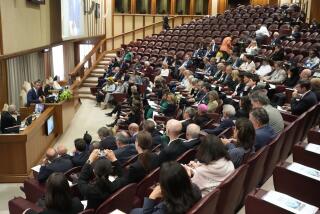Evangelical Group Puts Focus on Environment : Ecology: New coalition sparks serious dispute. Some church officials say it has exaggerated extent of Earth’s pollution and that stricter regulations would hurt economy.
- Share via
After years of focusing strictly on the needs of the human spirit, evangelicals are beginning to be concerned with the human habitat as well.
But as they make their way through this new terrain, the path is marked by uncertainty, apprehension and sometimes discord.
When evangelicals clash on the environment, the disagreement has more to do with differing views on science or the economy than on theological issues. Some evangelicals even question the reality of the so-called environmental crisis, citing a lack of conclusive scientific evidence.
The controversy is painted against the backdrop of the newly formed Evangelical Environmental Network, a joint venture of World Vision, a relief and humanitarian agency, and Evangelicals for Social Action, a coalition of theologically conservative activists involved in a broad range of public policy issues.
The group, which is based in suburban Philadelphia, released its first statement, “An Evangelical Declaration on the Care of Creation,” in March.
These evangelical environmentalists have sparked some serious disputes.
Robert Dugan, head of the Washington office of the National Assn. of Evangelicals, refused to sign the declaration and resigned from its advisory council last week.
“I have a concern that this issue is going to balloon into something of greater importance to the churches than it needs to be,” Dugan said. “I appreciate their calling attention to the problem, but it must be kept in perspective.”
Dugan is not the only one who believes the Evangelical Environmental Network exaggerated the environmental crisis and neglected the negative impact on the economy that stricter environmental laws will create.
“Extremist views like these promote destructive policies that will reduce the consumption of energy,” said E. Calvin Beisner, an expert in public policy and environmental issues at Covenant College in Lookout Mountain, Ga.
He has advised fellow evangelicals to stay clear of the group.
“There’s a growing anti-environment backlash” in the evangelical community, warned Richard Wright, an environmental scientist at Gordon College in Wenham, Mass., and the academic dean of the Au Sable Institute.
The critics fear that “if people begin taking environmental issues seriously, it will lead to costly governmental regulations for small business and industry which will stifle our economy,” Wright said.
But caring for the Earth does take priority over economic considerations because “environmental problems affect human beings” and human beings are the most important part of creation, insisted Cliff Benzel, the group’s director.
“The Earth has intrinsic value because God created it,” he said. “It is not our job to stamp it out.”
Jerry Wenger, a biology professor at Covenant College, also was invited to sign the environmental statement but declined because of its strong wording.
“Many statements were put in such extreme terms, I felt they should be a little more moderate,” he said.
“If the average person reads EEN’s information, they get the idea that everything is so bad,” Wenger said.
Conclusions about the state of the environment are usually based more on personal ideas than on scientific evidence, he said.
More to Read
Sign up for Essential California
The most important California stories and recommendations in your inbox every morning.
You may occasionally receive promotional content from the Los Angeles Times.













